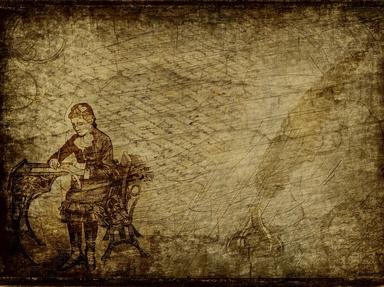Quiz Answer Key and Fun Facts
1. "The Roman Centurion's Song" is set in Britain in AD 410, when the Roman legions were recalled from this remote province to defend Italy and Rome itself.
Legate, I heard the news last night - my cohort ordered home
By ship to Portus Itius and thence by road to Rome.
I've marched the companies aboard; the arms are stowed below;
Now let another take my sword ________________________.
Complete the last line.
2. What event in English history is commemorated in the poem "The Reeds of Runnymede"?
3. The sight of steel would blanch his cheek,
the smell of baccy drive him frantic.
He was the author of his line.
He wrote that witches should be burnt;
He wrote that monarchs were divine,
And left a son who proved they weren't!
Which British king does this poem deal with?
4. If wars were won by feasting
Or victory by song,
Or safety found by sleeping sound,
How England would be strong!
But honour and dominion
Are not maintainèd so:
They're only got by sword and shot,
And this the ______________ know!
This poem is set in the 1660s. What word is missing from the last line?
5. At Blenheim and Ramillies fops would confess
They were pierced to the heart by the charms of Brown Bess.
Who or what was Brown Bess?
6. A tinker out of Bedford, a vagrant oft in quod,
A private under Fairfax, a minister of God -
Two hundred years and thirty ere Armageddon came,
His single hand portrayed it, and _________ was his name!
This is the first stanza of "The Holy War": what name is missing from the last line?
7. "How far is St Helena from a little child at play?" Whose career is sketched out in "A St Helena Lullaby"?
8. Here's to you, Fuzzy-Wuzzy, with your hayrick head of hair -
You big black bounding beggar - for you broke a British square!
Where did the "Fuzzy-Wuzzies" embarrass the British army?
9. "Then here's to Bobs Bahadur - little Bobs, Bobs, Bobs!" Which British military commander is the subject of "Bobs"?
10. Which conflict inspired Kipling's poems "The Absent-Minded Beggar," "Stellenbosch" and "The Half-Ballade of Waterval"?
Source: Author
TabbyTom
This quiz was reviewed by FunTrivia editor
MotherGoose before going online.
Any errors found in FunTrivia content are routinely corrected through our feedback system.
